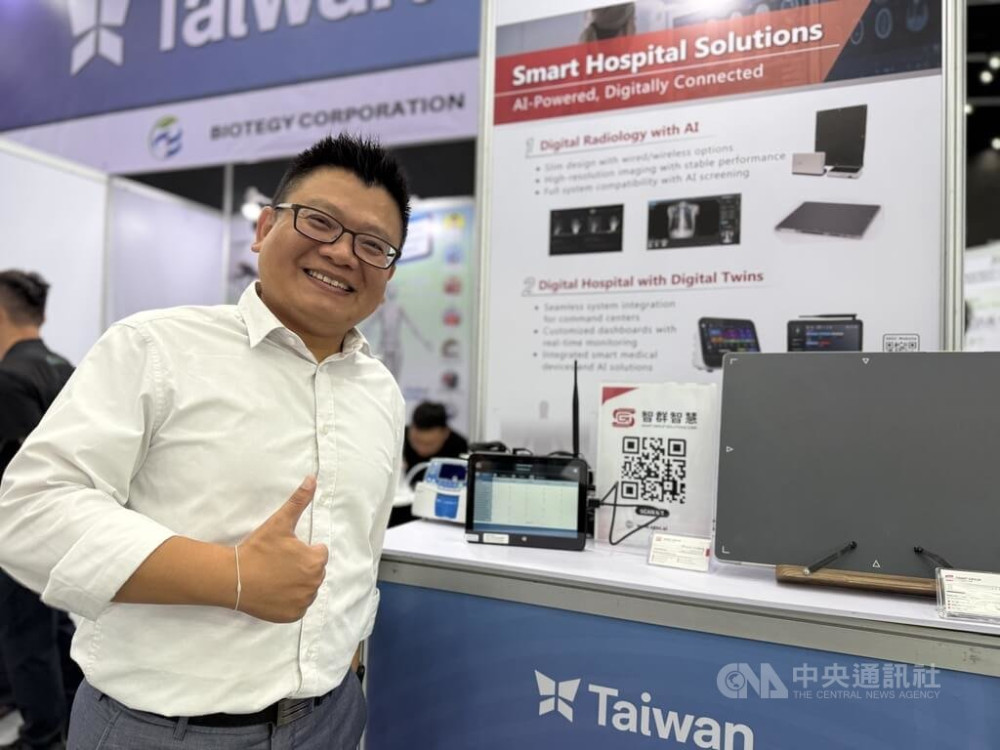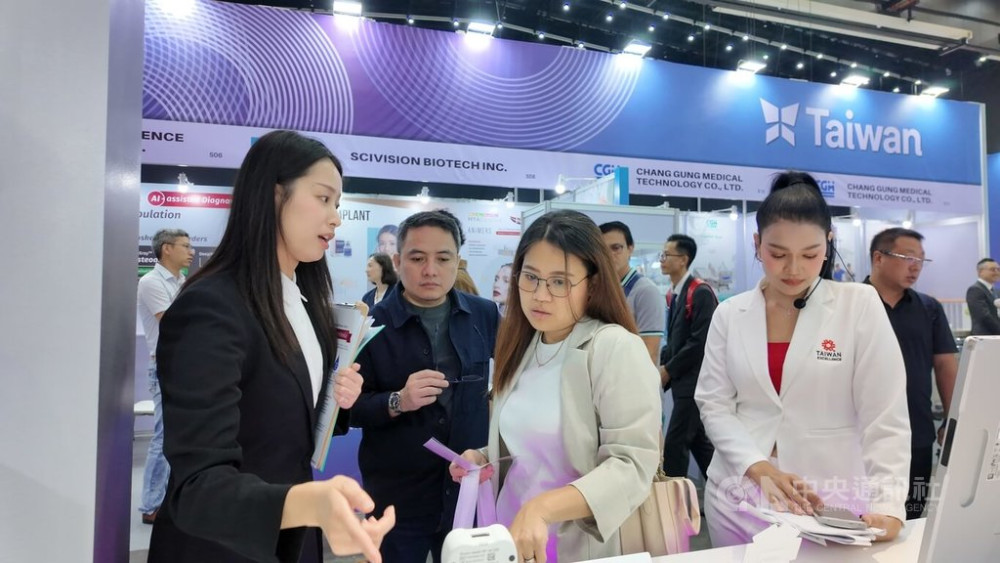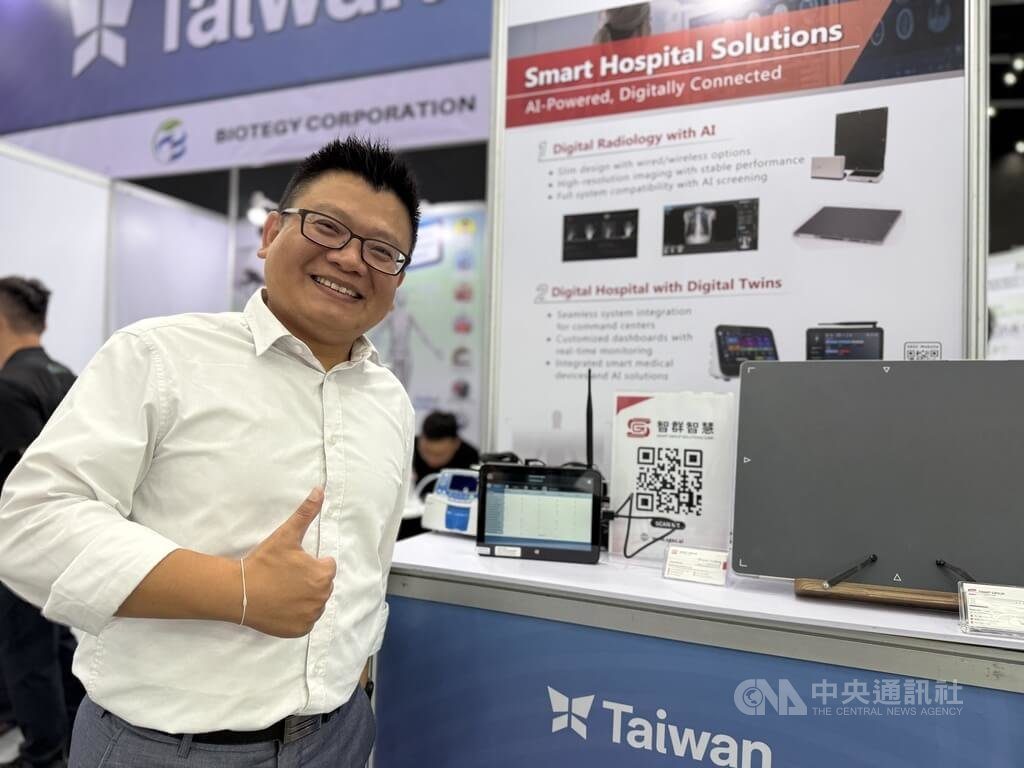SGSC Showcases Smart Healthcare Solutions at Medical Fair Asia 2025

Taiwanese Enterprises Participate in Medical Fair Asia 2025
Demonstrating Smart Healthcare Innovations and the Strength of Taiwan’s Medical Supply Chain
Bangkok, Sept. 10 (CNA Reporter Lee Tsung-Hsien) — Medical Fair Asia 2025 officially opened its doors from September 10 to 12 in Bangkok, Thailand, bringing together over 1,000 companies from more than 40 countries. With 112 participating exhibitors, Taiwan represents the second-largest national presence, highlighting its strength in smart healthcare technologies and medical equipment. Taiwanese companies are demonstrating AI innovations and digital transformation capabilities, underscoring the breadth and depth of Taiwan’s medical supply chain.
According to TAITRA (Taiwan External Trade Development Council), Medical Fair Asia is one of the most influential medical trade shows in Southeast Asia. Alternating annually between Singapore and Thailand, the show attracted over 10,000 professional buyers from 60 countries in its previous edition held in Singapore.
This year’s Thailand edition sees an expanded exhibition area—up 16% from previous years—reflecting strong demand. Taiwan’s delegation includes Smart Group Solutions Corp. (SGSC), MedFluid, BioSenseTek, Chang Gung Medical, and others, demonstrating a wide array of medical innovations and technologies.
TAITRA noted that the exhibition not only focuses on medical devices but also emphasizes aging population solutions, emerging technology applications, and healthcare manufacturing supply chains—making it a key strategic platform for Taiwanese firms to expand into Thailand and broader Southeast Asia.
Taiwan’s pavilion features smart healthcare and equipment providers, alongside biotech, OEM, rehabilitation, and accessories companies. Exhibits range from AI diagnostic solutions for osteoporosis, lung cancer, and chest diseases to hospital beds, oxygen concentrators, ultrasound systems, surgical tables, and lights.
Li Wen-Cheng, Director of Marketing Projects at TAITRA, emphasized Taiwan’s focus on the Thai and ASEAN markets, stating, “By participating in this show in Thailand, we aim to support Taiwanese businesses in reaching the broader Southeast Asian region.” He further highlighted Thailand’s leadership in health and medical tourism, calling it an ideal springboard into ASEAN due to its ambition and capabilities.
Exhibitor Dr. Wang Min-Liang, CEO of Taiwan Main Orthopaedics Biotechnology, presented their AR surgical guidance system, which uses MR-enabled smart glasses to help surgeons visualize incision sites and depths. “Our smart glasses are already in use at hospitals in Thailand,” he told CNA. “Surgeons can now perform spinal surgeries with far greater accuracy and efficiency.”
SGSC, another Taiwanese exhibitor, showcased their system integration solutions for digital hospital transformation. Senior Sales Manager Lee Ting-Yuan explained, “One of the biggest pain points for hospitals is the inconsistency of data formats. We help hospitals build unified data infrastructures that integrate hardware, AI software, and data management systems.”
In response to the aging population, several exhibitors are also promoting elderly-focused health tech. Synergy Vision, for instance, presented an AI-powered X-ray analysis system for diagnosing degenerative joint diseases, enabling automated tracking of skeletal conditions in the elderly.
Marketing Manager Wu Chang-Jung added that pairing traditional X-ray systems with their AI software significantly shortens the time needed for osteoporosis detection.
Another standout innovation came from iDrMed, whose smart medicine cabinets drew attention from many buyers. CEO Yu Chin-Shu explained, “Medication safety is a top priority for hospitals. Our system monitors inventory, tracks usage, and automatically generates reports to ensure proper medication handling.” He noted that premium hospitals in Thailand are potential clients, especially those seeking international accreditation. “Traditional key-lock systems lack traceability and pose safety risks,” he added.
(Edited by Kao Chao-Fen)
September 10, 2025

At the opening of Medical Fair Asia on September 10 in Bangkok, Mr. Ting-Yuan Lee, Senior Business Manager at Smart Group Solutions Corp. (SGSC), stated that one of the biggest challenges hospitals face in digital integration is the inconsistency of data formats. To address this issue, SGSC aims to support hospitals by building centralized data repositories and integrating hardware devices, AI software, and data management systems—ultimately driving digital transformation and enabling smart healthcare.
(Photo credit: CNA reporter Li Zong-Xian, Bangkok. Dated: September 10, 2025)

News Reference: Central News Agency, Taiwan (CNA) https://www.cna.com.tw/news/ahel/202509100236.aspx


